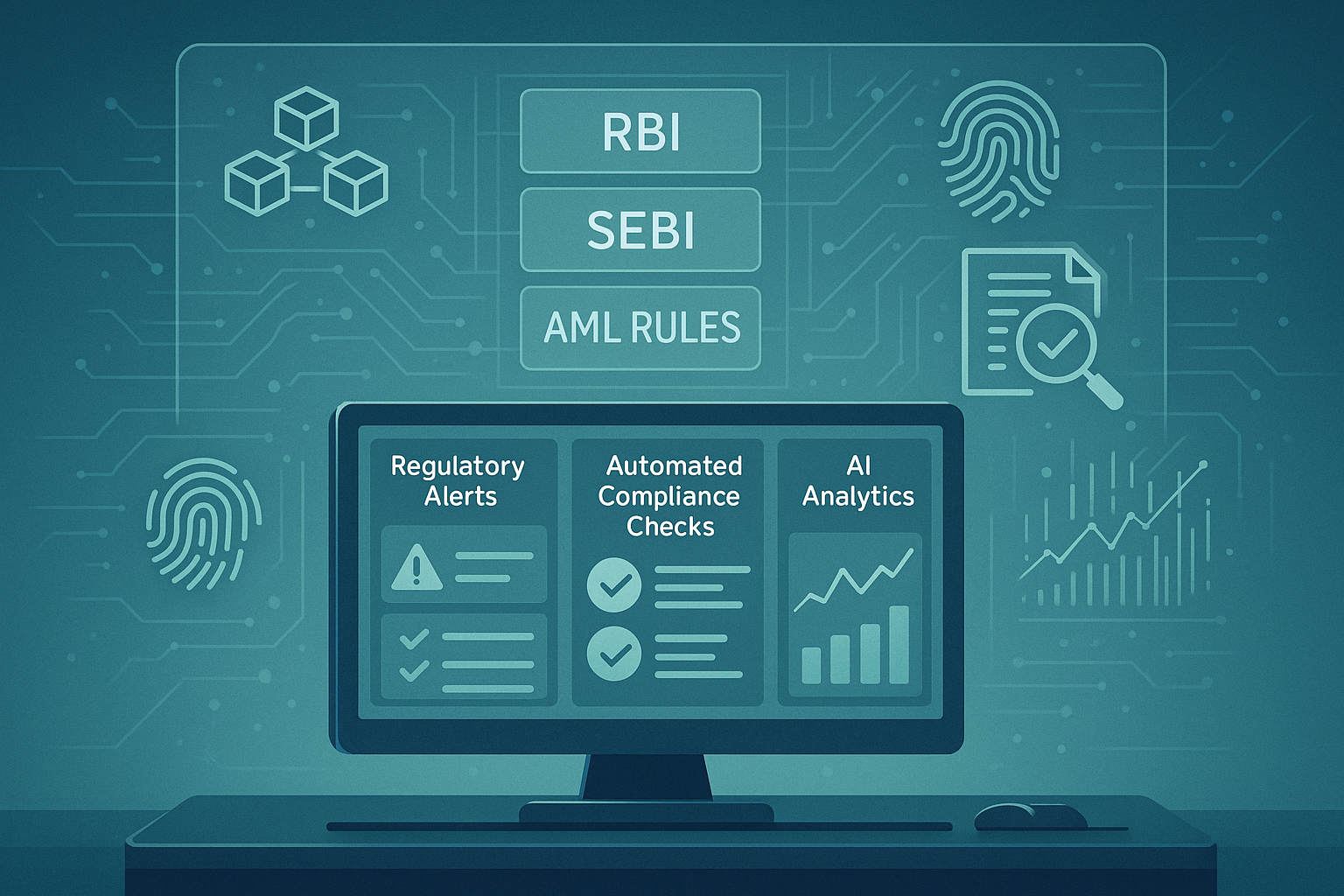As compliance becomes more complex and regulatory scrutiny intensifies, Regulatory Technology (RegTech) is emerging as a transformative force in India’s BFSI sector. Leveraging AI, machine learning, and blockchain, RegTech enables financial institutions to automate compliance processes, monitor risks in real-time, and adhere to evolving regulatory mandates with agility. This article explores how RegTech is reshaping compliance operations, the key technologies involved, current adoption trends, and the challenges ahead.
Background and Context
The Indian financial services landscape is governed by an intricate web of regulations from RBI, SEBI, IRDAI, and PFRDA. From KYC and AML compliance to data privacy, capital adequacy, and cyber resilience, traditional manual compliance methods have proven inadequate—especially in an era of digital banking and fintech expansion.
To address these challenges, BFSI firms are investing in RegTech platforms that use automation to:
Analyze regulations
Monitor transactions
Detect anomalies
Generate compliance reports
Facilitate real-time regulatory filings
According to a 2025 EY India report, the RegTech market in India is expected to grow at a CAGR of 21%, reaching $2.5 billion by 2030.
How RegTech Works in BFSI
AI and Machine Learning
Used for:
Real-time transaction monitoring to detect fraud, money laundering, or insider trading.
Predictive analytics to identify regulatory risks.
Automated document analysis for regulatory interpretation.
Blockchain and Smart Contracts
Ensures immutable audit trails.
Automates regulatory workflows like reconciliation, reporting, and settlement compliance.
Supports Regulatory Reporting Chains (RRCs) for transparent compliance logs.
Natural Language Processing (NLP)
Converts regulatory text into machine-readable logic, enabling automated compliance checks against updated laws and guidelines.
Cloud-based APIs
Allow secure integration with regulators (like RBI or SEBI) for instant compliance updates and direct e-filing of reports.
Popular Use Cases in India
Automated KYC/AML:
AI-driven tools scan customer documents, validate identities, and flag anomalies in seconds, reducing onboarding time by 70%.Real-Time Regulatory Reporting:
NBFCs and fintechs use RegTech to generate RBI filings (e.g., CRILC, FIU-IND) automatically and reduce human error.Fraud Risk and Insider Trading Monitoring:
SEBI-regulated brokers use surveillance engines to detect suspicious trades and market manipulation in real time.Regulation-as-a-Service (RaaS):
Startups like Signzy, Fintelle, and Recko offer plug-and-play compliance tools to smaller NBFCs and digital lenders.
Key Players and Industry Momentum
Indian RegTech Startups:
Signzy – AI-based onboarding and compliance automation
CredoLab – Alternate data-based credit risk evaluation
Recko – Reconciliation and reporting automation
IDfy – Identity verification and KYC stack
Tookitaki – AML and fraud detection using AI
Adopters:
Kotak Mahindra Bank, ICICI Bank, IndusInd Bank, and Bajaj Finserv have integrated RegTech into their risk and compliance functions.
Regulatory Push and Governance
RBI Initiatives:
Encourages RegTech adoption via its Regulatory Sandbox Framework
Issued guidelines for automated loan recovery and audit trails under the Digital Lending Norms (2022, updated 2024)
SEBI Regulations:
Mandated automated insider surveillance and trade monitoring for brokers and investment advisors
Piloted DLT (Distributed Ledger Technology) systems for mutual fund recordkeeping
“RegTech adoption is not just about efficiency—it’s about futureproofing the financial ecosystem against regulatory volatility,” said a senior RBI official at the 2025 India Compliance Summit.
Industry Perspectives
Anjali Nambiar, Head of Compliance at a major NBFC:
“RegTech helped us cut regulatory filing time by 60%. What took days now takes minutes.”
Rahul Kapoor, Co-founder of a RegTech firm:
“With AI, we convert thousands of pages of regulation into dynamic rule engines. This changes the game for compliance teams.”
Ritu Sharma, Fintech Policy Analyst:
“The future lies in machine-readable regulations and programmable compliance. India must create RegTech sandboxes just like fintech ones.”
Social Media Reactions from Industry Experts
@RegTechIndia:
“AI + Compliance = RegTech. Banks using bots for AML, auto-reporting, and fraud surveillance. Compliance is getting smarter. #RegTech #AIinBanking”
@FinRegUpdate:
“Blockchain-backed compliance records may become the norm. Immutable, traceable, and real-time. #DLT #BFSIInnovation”
@DigitalComplianceIN:
“India needs machine-readable regulations and RegTech APIs from RBI. Paper laws can’t handle AI-speed finance. #RegulatoryTech”
Challenges and Constraints
Legacy Systems Integration:
Many banks still run on outdated core systems that don’t integrate well with new RegTech APIs.Regulatory Ambiguity:
Current regulations are not written for automation, making NLP-driven interpretation difficult in some scenarios.Data Privacy and AI Bias:
Compliance automation must ensure ethical AI practices and compliance with India’s DPDP Act, 2023.Talent and Training Gaps:
BFSI compliance teams need significant upskilling to use AI tools and interpret RegTech analytics.
Future Outlook
India’s RegTech ecosystem is expected to evolve rapidly, with:
RBI likely to issue a RegTech sandbox in 2026
Machine-readable compliance mandates under discussion by SEBI
CBDC (Digital Rupee) transaction logs being auto-audited using blockchain
Financial institutions embedding compliance-by-design into all new digital products
Conclusion
RegTech is the silent engine powering India’s next-generation compliance infrastructure. By combining real-time analytics, automation, and secure digital trails, BFSI firms can not only enhance transparency and reduce costs, but also stay ahead of regulatory shifts. As the complexity of rules grows and digital finance scales, RegTech is becoming an indispensable layer in the BFSI tech stack—one where compliance meets code.












